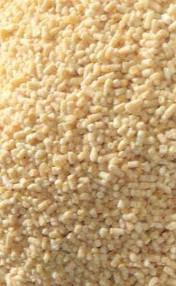Lecithin, a group of phospholipids, has been credited with providing several health benefits. Owing to this and the crucial role it plays in the human body, research is being conducted to comprehend and document these aspects. Current research indicates that when lecithin is used as a dietary supplement, it can be beneficial for the elderly. Here are some of the health benefits offered by lecithin:
One of the common problems that accompany aging is memory loss and it can be countered with lecithin. The compound, which comprises almost thirty percent of the brain, plays a crucial role in the digestion and utilization of fatty acids that enhance brain functions. These fatty acids ensure that the brain and nerves function optimally. When lecithin is present in optimal amounts in your system, it also provides you with acetylcholine. This is a neurotransmitter that helps the brain store and retrieve information – two important components of memory. Acetylcholine is also responsible for improving nerve signal effectiveness in the brain.
Corroborating this, a study indicates that when 65 year old healthy volunteers consumed two tablespoons of lecithin for a period of five weeks, they indicated a significant improvement in their memory. Also, post-treatment, the volunteers reported relatively lesser lapses in memory.
In addition to improving memory, lecithin also enhances learning, sensory feedback and memory. The compound also plays a role in motor co-ordination and formation of sleep patters.
Lower cholesterol levels
Lecithin’s ability to lower cholesterol is largely due to the presence of polyunsaturated fatty acids in it. Also, according to the American Journal of Clinical Nutrition, lecithin has the ability to increase the presence of purified phytosterols – that have the ability to lower cholesterol levels. Phytosterols achieve this by reducing the ability of intestines to absorb cholesterol. When lecithin is accompanied by sitostanol, this ability is further enhanced.
Another research indicates that soy stanols containing lecithin are capable of lowering the absorption of cholesterol by over 30%. When this combination is consumed along with egg whites, the absorption of cholesterol is lowered by approximately 38%.
Reducing intensity of bipolar disorder
Lecithin is used as part of the treatment for bipolar disorder - characterized by one or more episodes of mania and /or depression. The lipid contains inositol and choline, two compounds that play a key role in the management of the disorder. Also, it aids in the production of acetylcholine, a neurotransmitter that is capable of enhancing brain functions and mood stability – a crucial factor that can help manage bipolar disorder.
Other health benefits
• Lecithin plays a crucial role in the development of both: myelin sheath and cell membranes. This way, the compound helps cells maintain their structure and integrity. Owing to its ability to strengthen the myelin, it can even be used by those who suffer from multiple sclerosis.
• Also, lecithin helps transport fats that are essential for metabolic processes. As it also functions as an emulsifier, lecithin prevents cells from being oxidized.
• Preliminary research indicates that lecithin has a positive effect on cholesterol levels in the blood.
• The compound can also be beneficial in restoring the liver after a bout of illness.
Sources of lecithin
One of the most common sources of lecithin is egg yolk. Two other effective sources for it are soy granules and soy beans. Lecithin is also found in the brain tissue of sheep and chicken. Other good sources of lecithin are fish roe, fish eggs and food supplements.

